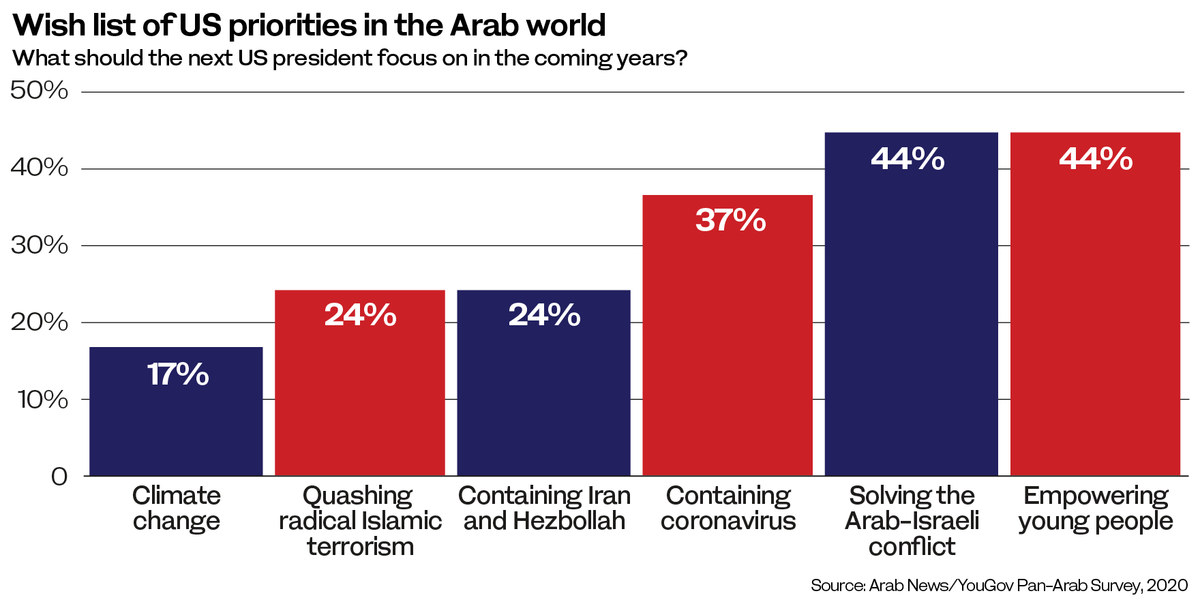RIYADH: Nearly half the respondents in an Arab News/YouGov poll conducted in 18 Middle East and Africa (MENA) countries believe neither candidate in the upcoming US elections will necessarily be good for the region.
Of the rest, 40 percent said Democratic Party candidate Joe Biden would be better for the region while 12 percent said the same thing about incumbent President Donald Trump. But a key takeaway of the poll is that if Biden, who served as vice president to Barack Obama until 2017, wins the White House race, he would be well advised to shed the Obama administration baggage.
When asked about policies implemented in the Middle East under the Obama administration, the most popular response (53 percent) was that the Democratic president left the region worse off, with another 58 percent saying Biden should distance himself from Obama-era policies.
The study surveyed a sample of 3,097 respondents online to find out how people in the MENA region feel about the Nov. 3 US elections.
Opinion
This section contains relevant reference points, placed in (Opinion field)
Containing Iran was found to be one of the top four issues that respondents wanted the next US president to focus on. Strong support for Trump both maintaining a war posture against Iran and imposing strict sanctions against the Tehran regime was noticed in Iraq (53 percent), Lebanon (38 percent) and Yemen (54 percent), three countries that have had intimate regional dealings with Iran.
President Trump’s 2017 decision to move the US Embassy in Israel to Jerusalem proved overwhelmingly unpopular, with 89 percent of Arabs opposing it. Surprisingly, in contrast to most other Arabs, Palestinian respondents inside the Palestinian Territories indicated a greater desire for the US to play a bigger role in mediation with Israel.
Arab opinion was largely split on the elimination this year of Iran’s regional “satrap” Gen. Qassem Soleimani, with the single largest proportion of respondents from Iraq (57 percent) and Lebanon (41 percent) seeing it as a positive move, as opposed to those in Syria and Qatar, where most respondents — respectively 57 percent and 62 percent — saw it as negative for the region.

Iran also figured in the list of perceived threats to US interests, although well behind white nationalism (32 percent) and China (22 percent). The other critical challenges for the US as viewed by Arabs were cybercrime, radical Islamic terrorism and climate change.
For a country that touts itself as an ally of the US, public attitudes in Qatar were found to be surprisingly out of sync with US objectives in the Middle East. The perception of radical Islamic terrorism, Iran and Islamist parties as the “three biggest threats facing the region” was much softer in Qatar compared with the region as a whole.
It came as little surprise that three quarters of respondents want the next US administration to make it easier for people from Arab countries to travel to the US. The figure for Lebanon, for instance, was even higher, 79 percent, underscoring concerns that many young Arabs are actively trying to leave the region.
Among other findings, Arabs remain overwhelmingly concerned about such challenges as failed government (66 percent) and the economic slowdown (43 percent).
Close to half of the respondents (44 percent) would like to see the next US president focus on empowering young people in the Arab region and solving the Arab-Israeli conflict (44 percent), followed by containing COVID-19 (37 percent), reining in Iran and Hezbollah (24 percent), quashing radical Islamic terrorism (24 percent) and tackling climate change (17 percent).



















